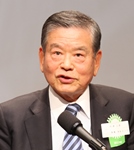Dreams Make You Strong
February 5, 2014
Mr. Saburo Kawabuchi
Captain (Supreme Advisor),
Japan Football Association
�� Football has much wider understanding in Japan today, but when we first launched the J. League in 1993, many comments on the media went like ��a football does not have a dramatic ending, something like the baseball game-winning home run in the bottom of the ninth inning.�� The ��Tragedy in Doha�� later that year, however, made many people in Japan realize that football games can also have dramatic endings. Japan was playing against Iraq in the final round of the Asian zone to qualify for the 1994 FIFA World Cup in the US, when the game-tying goal from the Iraqi team just after the match entered stoppage time shattered our dreams to make it to the World Cup finals for the first time. This match achieved the highest viewer rating of 48.1% on TV Tokyo.
Football has much wider understanding in Japan today, but when we first launched the J. League in 1993, many comments on the media went like ��a football does not have a dramatic ending, something like the baseball game-winning home run in the bottom of the ninth inning.�� The ��Tragedy in Doha�� later that year, however, made many people in Japan realize that football games can also have dramatic endings. Japan was playing against Iraq in the final round of the Asian zone to qualify for the 1994 FIFA World Cup in the US, when the game-tying goal from the Iraqi team just after the match entered stoppage time shattered our dreams to make it to the World Cup finals for the first time. This match achieved the highest viewer rating of 48.1% on TV Tokyo.
��FIFA (Fédération Internationale de Football Association) held the first World Cup competition in Uruguay in 1930, initiated by the then FIFA President Jules Rimet who wished to ��hold a world championship outside the Olympics.�� The 1950 World Cup was held in Brazil after World War II, and its final match between Brazil and Uruguay attracted as many as 250,000 spectators to the world��s largest Maracanã Stadium with the capacity of 180,000 people. The defeat of Brazil made some distraught fans commit suicide.
��The Japanese team first attempted to participate in the World Cup in 1954. Both of the two qualification matches were played in Japan, as the South Korean President Yi Seung-man refused to allow Japan to play on their territory. South Korea made it to the finals in Switzerland, yet their crushing defeat exposed the wide gap with teams around the world.
��As I mentioned earlier, the 1994 World Cup in the US was our second big chance to qualify for the finals, but only if the Japanese team won in Doha. The far-sighted FIFA President Havelange believed that making the sport popular in Asia and the US would accelerate development of the football circle.
��World Cup games somehow coincide with the summit meetings. Germany fought the 1990 World Cup final match against Argentina. Leaders from around the world didn��t mind at all, when Chancellor Kohl showed up late to the Houston meeting as he had been to Rome to cheer the German team. I cannot forget the 1994 summit meeting in Naples, as the Secretary to the then Prime Minister Murayama visited me to get some interesting episodes on football to be shared during the lunch meeting. I advised him to name some star players from other countries who were playing among the J. League teams, including Gary Lineker from England, Pierre Littbarski from Germany and Salvatore Schillaci from Italy. It was a pity that Prime Minister Murayama got sick and could not attend the lunch meeting where he meant to share the stories he had memorized.
��Japan won the bronze medal in the 1968 Summer Olympics in Mexico, yet our teams have failed to qualify for the finals in the Asian zone over 28 years. It was in the 1998 World Cup in France that Japan qualified to proceed to the finals for the first time. The inauguration of the J. League provided impetus for the sport.
��Keisuke Honda, currently playing for Serie A club AC Milan, serves as a superb model for achieving his childhood dreams come true. As a 12-year-old schoolboy, he wrote that he would go and play for Serie A team as the No. 10 player (superstar player). I was deeply impressed to learn that such big dreams can inspire you.
��As we head towards the World Cup in June, how well the Japanese team performs depends on whether those Japanese players playing overseas can secure a regular position and compete well among high-level teams. When we analyze the Japanese teams by three factors of collective strengths (taking into account how internationally minded and skilled the players are), strategic competence and performance, the 2002 team led by head coach Philippe Troussier achieved superior strategic performance (gained the 16th place) and players became more internationally minded. The 2006 team was said to be the best, yet its performance was not that great and they failed to make it to the finals. The 2010 team enjoyed superior performance, with excellent leadership by head coach Takeshi Okada, to reach the top 16. The team for this World Cup is likely to include the largest number of 8 to 9 Japanese players playing overseas. I can say that it will be the strongest team ever with excellent attacking performance. If they perform well, I am sure they can advance to the top 8 or top 4 teams.